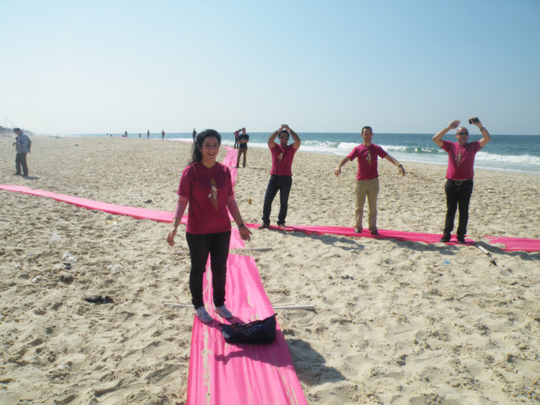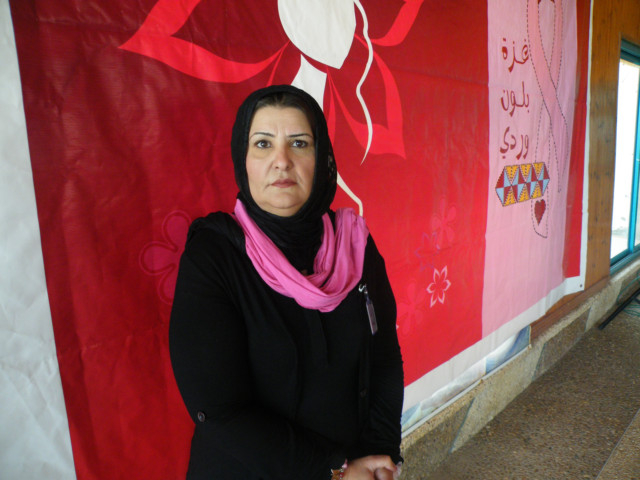
Gaza: Sitting on the Gaza beach Eman Shanoun, a breast cancer survivor, 45, is witnessing the procedures of measuring the biggest awareness ribbon in the world by the Guinness World Records.
Eman said: “It was a normal day like any other. Thirteen years ago I went to the clinic assuming that I might have a small problem in my skin, but the doctor there transferred me to Al Shifa hospital, I felt there might be something and tried to check up myself and remained optimistic but after two weeks later my doctor informed me that I have breast cancer.”
Eman said: “After the doctor mentioned cancer I didn’t hear anything else. I stood speechless and my mind was full of fear and thoughts on one thing, my daughter. The first question I asked the doctor was the cancer hereditary and when he answered ‘not usually’ I felt a little bit of relief.”
“Pain, frustration, fear and hope become daily feelings for me and there were days, especially in the beginning of the treatment, when I thought that my end was near and the only thing that gave me hope were my daughter and son,” Eman added.
With more than 40 per cent unemployment, few people in Gaza can afford the costs of referral and receiving treatment outside the coastal territory.
She added, “Despite my husband getting a good salary from the Palestinian Authority we barely could manage the cost of medical treatment since the drugs and chemical medication were so expensive and I also had to travel a lot to Egypt for treatment.”
The hospitals in the Gaza Strip can hardly provide any services or medical treatment to patients who have cancer because of the huge lack of the required equipment and medicines.
Mohammad Al Zemili, the ministry of health’s store director, says: “For many years we have been suffering this shortage which affects all departments in the Strip’s hospitals, especially oncology which is considered rare and expensive.”
Most of the cancer patients in Gaza have to be referred outside for treatment mostly in Egypt or the West Bank and sometimes in the state of Israel.
Around 75 per cent of husbands leave their wives instead of standing by them during this illness, Al Zemili says.
Dr Amal Al Ela, an oncology doctor in a local clinic, said: “Many of the women who come to us have no clue that they have cancer; they come to check on other ailments.
Dr Al Ela added, “In previous years most of the cases were women in their 40s and 50s but now we are getting more patients in their 30s.
Even after fighting cancer Eman didn’t stop there and kept on fighting this disease by establishing an association called support and hope for breast cancer patients.
Eman added: “If I didn’t stay and fight cancer, I wouldn’t be here today to witness this great event.”
The celebration comes to encourage the women in Gaza to do advance check ups for breast cancer and to inform them how to check the disease in advance and urge those who have cancer to fight it and tell them they aren’t alone.













